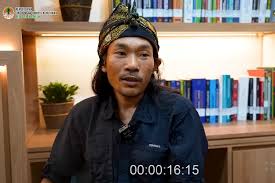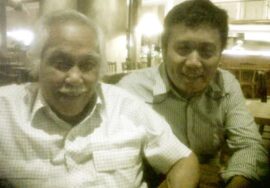Juliana’s Evacuation: When the Terrain Is Tougher Than the Response and Safety Management System

Mount Rinjani once again holds a sorrowful story. A Brazilian hiker, Juliana, was found dead after falling along the treacherous Torean trail. The tragedy caught both national and international attention—not just because of who the victim was, but because of the extreme difficulty of the evacuation terrain, which sadly wasn’t matched by an adequate safety management system.
But behind this tragedy lies a glimmer of hope: the extraordinary efforts of volunteers and the search and rescue (SAR) team—especially Agam Rinjani, a man who risked his life for one mission: to bring Juliana home, no matter the cost.
Not Just Slow—The Terrain Was Brutal
Many voices on social media criticized the evacuation for being too slow. But the truth is, this wasn’t about speed—it was about survival in a brutally unforgiving landscape: loose rocks, a 1,200-meter-deep ravine, thick fog, extreme weather, and nearly no safe footholds.
“If it had rained that night, we all could’ve died,” said Agam, who hung off the cliffside with the team for nine hours to bring Juliana’s body back up.
The evacuation took place on a vertical cliff, without tents, without sleeping pads, relying solely on over 1,300 meters of rope. Every move had to be precise. The risk? Nearly unmanageable without sheer will and unwavering courage.

Volunteers Risked Their Lives While the System Lagged Behind
Agam and his team aren’t government workers. They’re volunteers. And that’s the painful irony—mountain safety often depends on people moved by compassion, not by a robust system.
Agam even expressed his frustration:
“I truly believed Juliana was still alive when she fell. But Jakarta was too far from Lombok, and there was no helicopter ready to reach the location in time.”
Evacuation equipment, which should’ve been prepped long before, seemed poorly coordinated. Rinjani is one of Indonesia’s top nature tourism icons—it deserves an emergency response system that matches that reputation.
When an Evacuation Becomes a National Duty
This was no longer just about one lost life—it became about national dignity. Comments from Brazilian and Latin American netizens criticized Indonesia’s rescue system as slow, unprofessional, and unsafe. And that lit a fire in Agam.
“I brought the Red and White flag with me. This wasn’t just an evacuation—it was about defending Indonesia’s name,” he said.
Imagine—a man from Makassar, living at the foot of Rinjani, climbs into danger without knowing if he’d return, simply because he couldn’t bear to see his country shamed.
A Turning Point: Don’t Let This Happen Again
This tragedy should be a wake-up call. The mountain safety system must be overhauled. Agam has proposed a Mountain Rescue Rinjani program: training porters, guides, and educating hikers on surviving extreme conditions.
“People climb mountains to find joy—not to become a memory,” said Agam.
Juliana’s story opened our eyes. Yes, the terrain is tough, but our response and readiness don’t have to be. We may not control nature, but we can control how we prepare for it.
Don’t Let Their Sacrifice Be in Vain
Juliana didn’t survive. But the fight to save her was a pure act of humanity—something we should deeply respect. We don’t just need heroes like Agam. We also need a system that supports them—so that no more lives are lost to bureaucracy or lack of preparedness.
May Rinjani continue to be a place of beauty in the future—not a place of sorrow. A place where adventure means coming home safely, with stories to tell—not leaving behind heartbreak.
“Because saving one life means saving humanity.”
Convert Your Videos Into Engaging Stories
By Ahsantany, Manager of Ahsantaweb.com.
If you have a video you’d like transformed into a compelling and easy-to-read article—for blog posts, social media, or any content platform—we’re here to help.
Contact via WhatsApp








